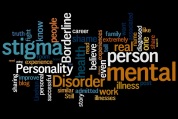Anneke Sips, Amsterdam
The next Week of Psychiatry is from March 24 – 30th 2014. This 40th edition has the theme ‘Being owner of your own life!’. The basic principle is that people with mental health problems are as much as possible, directing their own lives.
The underlying question is what these people can do themselves to gain this ownership (again)? What can they do themselves to address their social responsibilities and role(s) in society and participate as citizens? Restoring you do yourself basically , but often in collaboration with others. And that leads to the question: What facilitating role can, or should, play the other? Family, social workers, friends, neighbors, police, doctors, churches , health insurers…. Yoga therapists? The Week of Psychiatry 2014 focuses specifically on this group. This all within the context of the governmental changes within and around the care of a participative society .
If you like to know a bit more about the history of the Week of Psychiatry in Holland, click here.
In my role as a Dutch health care worker (RN) I have strong ideas about how we should ban Stigma out of our work climate. Also we as health care professionals, or maybe: especially us health care professionals are should be very aware of this. I see it happen over and over and over again that psychiatrist or other workers think FOR the patient and are not really listening so well. It takes away the power of a patient who becomes weaker. Some facts about stigma:
- Stigma may be described as a label that associates a person to a set of unwanted characteristics that form a stereotype.
- Stigma may affect the behavior of those who are stigmatized. Those who are stereotyped often start to act in ways that their stigmatizers expect of them. It not only changes their behavior, but it also shapes their emotions and beliefs.Members of stigmatized social groups often face prejudice that causes depression. These stigmas put a person’s social identity in threatening situations, like low self-esteem. Because of this, identity theories have become highly researched. Identity threat theories can go hand-in-hand with Labeling Theory.
- In Unraveling the Contexts of Stigma, authors Campbell and Deacon describe Goffman’s universal and historical forms of Stigma. One of the kinds of stigma is: Known Deviations in Personal Traits – being perceived rightly or wrongly, as weak willed, domineering or having unnatural passions, treacherous or rigid beliefs, and being dishonest, e.g., mental disorders, imprisonment, addiction, homosexuality, unemployment, suicidal attempts and radical political behavior.
- Members of stigmatized groups may have lower self-esteem than those of non-stigmatized groups.
How can we help them? First: create awareness and…. STOP STIGMATIZING! I created lots of awareness and learned much about how to do this in the LEAP training by Xavier Amador. How to build relationships with clients. How to really listen. How not to think ‘we know everything better’ as a mental health care professional. How to work at common ground on a solution the person you work with prefers. It’s empowering! Think well about how someone can be the owner of their own life again!
As a yoga teacher/ therapist we should also be mindful about this too. Do you label yourself? Others? What about a yogi from another tradition? Do you ever decide what is ‘good yoga’ and what is ‘bad yoga’? A good or bad yogi perhaps? Do you think of fellow yogi’s as weak willed or with rigid beliefs? Being dishonest or untrue? Could you judge this? Non-judgent can be a practice too!
• Yoga Therapy is a self-empowering process, where the Care Seeker is responsible for his/ her healing process.
• Yoga Therapy is taught in an individualized one-to-one setting .
• Yoga Therapy is multi-dimensional in its approach, often utilizing many tools of Yoga
• Yoga Therapy is based on the individual’s needs
• Yoga Therapy is context sensitive, respecting the stage of life, occupation, ability and other parameters of the individual
• Yoga Therapy is an evolving process, not an instant solution
• Yoga Therapy is a collaborative and complementary system of self health care
Source: sky-yoga.net
Yoga is an ancient, self-empowering practice that utilizes a wide range of tools to enhance well-being and to maintain and restore health. I want to teach people to let go of expectations and fear and learn from their own direct experiences, make contact with their intuition and trust (and Love) themselves (again). I don’t believe in changing people or ‘fix’ them, but rather help them find their own true nature and healing. This counts actually in both my work as a social psychiatric nurse as well as being a yoga teacher/ therapist.
“Yoga, as a way of life and a philosophy, can be practiced by anyone with inclination to undertake it, for yoga belongs to humanity as a whole. It is not the property of any one group or any one individual, but can be followed by any and all, in any corner of the globe, regardless of class, creed or religion.” – Sri K. Pattabhi Jois
In both Yoga and social psychiatry our work is based on connection. Connection within yourself but also the connection with the world outside one self. With others. In social psychiatry we learn that you cannot see the individual separate from the context. Then again, what facilitating role can, or should, play the other? In mental health care? And what facilitating role can play the teacher of yoga? These are very interesting question to think of. And I Love to invite you all to talk about this in the next Yoga & Mental Health Sangha. Do you like to connect with like-minded people to discuss this more? Please leave a message if you like to be invited too!! Because our great teacher Desikachar quoted:
“With the right connection – beautiful things can happen.” – T.K.V. Desikachar
With Love,
Anneke